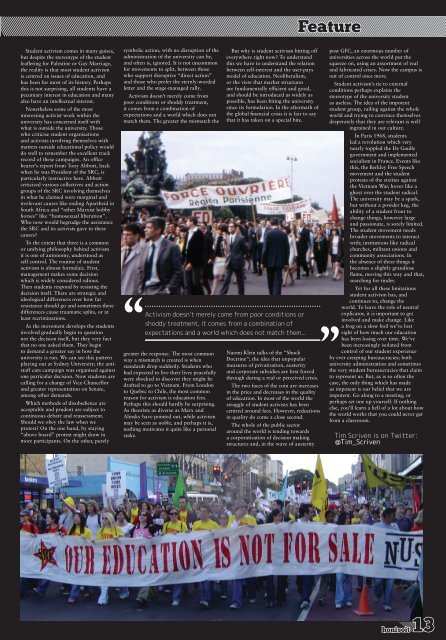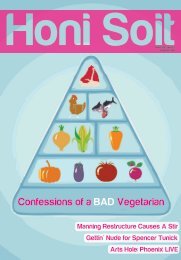Disco Biscuit Love: data on the drug market TABOO Road Test: Bag ...
Disco Biscuit Love: data on the drug market TABOO Road Test: Bag ...
Disco Biscuit Love: data on the drug market TABOO Road Test: Bag ...
Create successful ePaper yourself
Turn your PDF publications into a flip-book with our unique Google optimized e-Paper software.
Student activism comes in many guises,<br />
but despite <strong>the</strong> stereotype of <strong>the</strong> student<br />
leafleting for Palestine or Gay Marriage,<br />
<strong>the</strong> reality is that most student activism<br />
is centred <strong>on</strong> issues of educati<strong>on</strong>, and<br />
has been for most of its history. Perhaps<br />
this is not surprising, all students have a<br />
pecuniary interest in educati<strong>on</strong> and many<br />
also have an intellectual interest.<br />
N<strong>on</strong>e<strong>the</strong>less some of <strong>the</strong> most<br />
interesting activist work within <strong>the</strong><br />
university has c<strong>on</strong>cerned itself with<br />
what is outside <strong>the</strong> university. Those<br />
who criticise student organisati<strong>on</strong>s<br />
and activists involving <strong>the</strong>mselves with<br />
matters outside educati<strong>on</strong>al policy would<br />
do well to remember <strong>the</strong> excellent track<br />
record of <strong>the</strong>se campaigns. An office<br />
bearer’s report from T<strong>on</strong>y Abbott, back<br />
when he was President of <strong>the</strong> SRC, is<br />
particularly instructive here. Abbott<br />
criticised various collectives and acti<strong>on</strong><br />
groups of <strong>the</strong> SRC involving <strong>the</strong>mselves<br />
in what he claimed were marginal and<br />
irrelevant causes like ending Apar<strong>the</strong>id in<br />
South Africa and “o<strong>the</strong>r Marxist hobby<br />
horses” like “homosexual liberati<strong>on</strong>”.<br />
Who now would begrudge <strong>the</strong> assistance<br />
<strong>the</strong> SRC and its activists gave to <strong>the</strong>se<br />
causes?<br />
To <strong>the</strong> extent that <strong>the</strong>re is a comm<strong>on</strong><br />
or unifying philosophy behind activism<br />
it is <strong>on</strong>e of aut<strong>on</strong>omy, understood as<br />
self c<strong>on</strong>trol. The routine of student<br />
activism is almost formulaic. First,<br />
management makes some decisi<strong>on</strong><br />
which is widely c<strong>on</strong>sidered odious.<br />
Then students resp<strong>on</strong>d by resisting <strong>the</strong><br />
decisi<strong>on</strong> itself. There are strategic and<br />
ideological differences over how far<br />
resistance should go and sometimes <strong>the</strong>se<br />
differences cause traumatic splits, or at<br />
least recriminati<strong>on</strong>s.<br />
As <strong>the</strong> movement develops <strong>the</strong> students<br />
involved gradually begin to questi<strong>on</strong><br />
not <strong>the</strong> decisi<strong>on</strong> itself, but <strong>the</strong>y very fact<br />
that no <strong>on</strong>e asked <strong>the</strong>m. They begin<br />
to demand a greater say in how <strong>the</strong><br />
university is run. We can see this pattern<br />
playing out at Sydney University; <strong>the</strong> antistaff<br />
cuts campaign was organised against<br />
<strong>on</strong>e particular decisi<strong>on</strong>. Now students are<br />
calling for a change of Vice-Chancellor<br />
and greater representati<strong>on</strong> <strong>on</strong> Senate,<br />
am<strong>on</strong>g o<strong>the</strong>r demands.<br />
Which methods of disobedience are<br />
acceptable and prudent are subject to<br />
c<strong>on</strong>tinuous debate and reassessment.<br />
Should we obey <strong>the</strong> law when we<br />
protest? On <strong>the</strong> <strong>on</strong>e hand, by staying<br />
“above board” protest might draw in<br />
more participants. On <strong>the</strong> o<strong>the</strong>r, purely<br />
symbolic acti<strong>on</strong>, with no disrupti<strong>on</strong> of <strong>the</strong><br />
administrati<strong>on</strong> of <strong>the</strong> university can be,<br />
and often is, ignored. It is not uncomm<strong>on</strong><br />
for movements to split, between those<br />
who support disruptive “direct acti<strong>on</strong>”<br />
and those who prefer <strong>the</strong> sternly-worded<br />
letter and <strong>the</strong> stage-managed rally.<br />
Activism doesn’t merely come from<br />
poor c<strong>on</strong>diti<strong>on</strong>s or shoddy treatment,<br />
it comes from a combinati<strong>on</strong> of<br />
expectati<strong>on</strong>s and a world which does not<br />
match <strong>the</strong>m. The greater <strong>the</strong> mismatch <strong>the</strong><br />
greater <strong>the</strong> resp<strong>on</strong>se. The most comm<strong>on</strong><br />
way a mismatch is created is when<br />
standards drop suddenly. Students who<br />
had expected to live <strong>the</strong>ir lives peacefully<br />
were shocked to discover <strong>the</strong>y might be<br />
drafted to go to Vietnam. From L<strong>on</strong>d<strong>on</strong><br />
to Quebec to Chile, <strong>the</strong> most comm<strong>on</strong><br />
reas<strong>on</strong> for activism is educati<strong>on</strong> fees.<br />
Perhaps this should hardly be surprising.<br />
As <strong>the</strong>orists as diverse as Marx and<br />
Alinsky have pointed out, while activism<br />
may be seen as noble, and perhaps it is,<br />
nothing motivates it quite like a pers<strong>on</strong>al<br />
stake.<br />
facebook.com/h<strong>on</strong>isoitsydney<br />
But why is student activism hitting off<br />
everywhere right now? To understand<br />
this we have to understand <strong>the</strong> relati<strong>on</strong><br />
between self-interest and <strong>the</strong> user-pays<br />
model of educati<strong>on</strong>. Neoliberalism,<br />
or <strong>the</strong> view that <strong>market</strong> structures<br />
are fundamentally efficient and good,<br />
and should be introduced as widely as<br />
possible, has been biting <strong>the</strong> university<br />
since its formulati<strong>on</strong>. In <strong>the</strong> aftermath of<br />
<strong>the</strong> global financial crisis it is fair to say<br />
that it has taken <strong>on</strong> a special bite.<br />
“Activism doesn’t merely come from poor c<strong>on</strong>diti<strong>on</strong>s or<br />
shoddy treatment, it comes from a combinati<strong>on</strong> of<br />
expectati<strong>on</strong>s and a world which does not match <strong>the</strong>m...<br />
Naomi Klein talks of <strong>the</strong> “Shock<br />
Doctrine”; <strong>the</strong> idea that unpopular<br />
measures of privatisati<strong>on</strong>, austerity<br />
and corporate subsidies are best forced<br />
through during a real or perceived crisis.<br />
The two faces of <strong>the</strong> coin are increases<br />
in <strong>the</strong> price and decreases in <strong>the</strong> quality<br />
of educati<strong>on</strong>. In most of <strong>the</strong> world <strong>the</strong><br />
struggle of student activists has been<br />
centred around fees. However, reducti<strong>on</strong>s<br />
in quality do come a close sec<strong>on</strong>d.<br />
The whole of <strong>the</strong> public sector<br />
around <strong>the</strong> world is tending towards<br />
a corporatisati<strong>on</strong> of decisi<strong>on</strong> making<br />
structures and, in <strong>the</strong> wave of austerity<br />
Feature<br />
post GFC, an enormous number of<br />
universities across <strong>the</strong> world put <strong>the</strong><br />
squeeze <strong>on</strong>, using an assortment of real<br />
and fabricated crises. Now <strong>the</strong> campus is<br />
out of c<strong>on</strong>trol <strong>on</strong>ce more.<br />
Student activism’s tie to external<br />
c<strong>on</strong>diti<strong>on</strong>s perhaps explains <strong>the</strong><br />
stereotype of <strong>the</strong> university student<br />
as useless. The idea of <strong>the</strong> impotent<br />
student group, railing against <strong>the</strong> whole<br />
world and trying to c<strong>on</strong>vince <strong>the</strong>mselves<br />
desperately that <strong>the</strong>y are relevant is well<br />
ingrained in our culture.<br />
In Paris 1968, students<br />
led a revoluti<strong>on</strong> which very<br />
nearly toppled <strong>the</strong> De Gaulle<br />
government and implemented<br />
socialism in France. Events like<br />
this, <strong>the</strong> Berkley Free Speech<br />
movement and <strong>the</strong> student<br />
protests of <strong>the</strong> sixities against<br />
<strong>the</strong> Vietnam War, hover like a<br />
ghost over <strong>the</strong> student radical.<br />
The university may be a spark,<br />
but without a powder keg, <strong>the</strong><br />
ability of a student fr<strong>on</strong>t to<br />
change things, however large<br />
and passi<strong>on</strong>ate, is sorely limited.<br />
The student movement needs<br />
broader movements to interact<br />
with; instituti<strong>on</strong>s like radical<br />
churches, militant uni<strong>on</strong>s and<br />
community associati<strong>on</strong>s. In<br />
<strong>the</strong> absence of <strong>the</strong>se things it<br />
becomes a slightly grandiose<br />
flame, moving this way and that,<br />
searching for tinder.<br />
Yet for all <strong>the</strong>se limitati<strong>on</strong>s<br />
student activism has, and<br />
c<strong>on</strong>tinues to, change <strong>the</strong><br />
world. To leave <strong>the</strong> role of neutral<br />
explicator, it is important to get<br />
involved and make change. Like<br />
a frog <strong>on</strong> a slow boil we’ve lost<br />
sight of how much our educati<strong>on</strong><br />
has been losing over time. We’ve<br />
been increasingly isolated from<br />
c<strong>on</strong>trol of our student experience<br />
by ever creeping bureaucracies; both<br />
university administrati<strong>on</strong> and sometimes<br />
<strong>the</strong> very student bureaucracies that claim<br />
to represent us. But, as is so often <strong>the</strong><br />
case, <strong>the</strong> <strong>on</strong>ly thing which has made<br />
us impotent is our belief that we are<br />
impotent. Go al<strong>on</strong>g to a meeting, or<br />
perhaps set <strong>on</strong>e up yourself. If nothing<br />
else, you’ll learn a hell of a lot about how<br />
<strong>the</strong> world works that you could never get<br />
from a classroom.<br />
”<br />
Tim Scriven is <strong>on</strong> Twitter:<br />
@Tim_Scriven<br />
h<strong>on</strong>isoit 13






